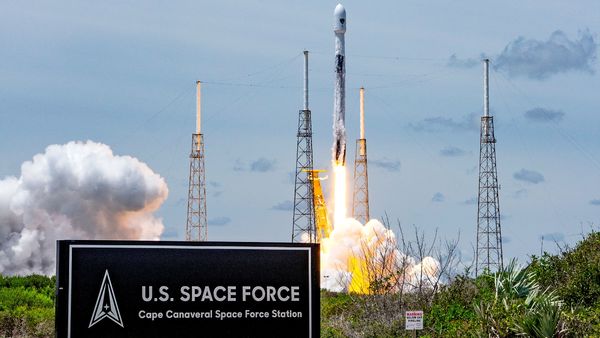The biggest global trade war since the 1930s exploded this week — and as a weary Downing Street was forced to concede, no one is immune from its fallout. Donald Trump’s so-called “Liberation Day” tariffs designed to usher in a golden era of US manufacturing and economic growth were greeted with undisguised glee by the hardcore Maga ultras.
One particularly overexcited super-Trumpite, former chief strategist Steve Bannon, even went as far as to suggest that April 2 should become a new US national holiday “to honour the jobs, skills and trade that returned to America and her workers”.
For the rest of us there can be no celebration, even if a post-Brexit Britain escaped the far harsher tariffs levied on the European Union. But even in a best-case scenario the new era of a minimum 10 per cent trade barrier into the world’s biggest national market will slow global economic growth and throw up yet another administrative friction nightmare for exporters. In a worst-case scenario it could plunge the world economy into a new deep freeze.
Even James Bond is not immune. The maker of 007’s trademark sports car of choice, Aston Martin, this week downgraded its sales forecast on the back of the 25 per cent tariffs on all imports of non-US made vehicles to America.

Not surprisingly, stock markets around the world, even in the US, the country that is supposed to benefit from all this, reacted with dismay with the S&P future contract pointing to a fall of around 2.5 per cent when markets open in New York later today. But just how bad will Trump’s bull in a china shop tariff turmoil be for the UK? After all, the US is Britain’s biggest single national export market with machinery, transport equipment and chemicals among the largest industry categories.
The good news is that the UK got off relatively lightly compared with some major US trading partners, in part because our exports and imports of goods across the Atlantic are roughly in balance, making it less of a “foe” in Trumpian terms than, say, China or the European Union. It is a different story on services, with the UK exporting £126.3 billion worth in 2023, compared with imports of £57.4 billion. Thankfully there is no suggestion, for now, that the Trump administration will target services.
Nevertheless, UK exports worth around £60 billion will be caught by the new Liberation Day regime, adding a new and unhelpful brake on Rachel Reeves’s ambitions to steer the moribund British economy towards a higher level of growth.
However, there was palpable relief among British ministers last night that the new tariffs — described by one former IMF economist as the equivalent of “dropping a nuclear bomb on the global trading system” — were set at only half the level of the 20 per cent imposed on the European Union. Downing Street will hope that there is still a chance that the tariffs, due to come into effect on April 5, will only last for a few weeks before a comprehensive US-UK trade deal can be signed with the Trump administration. According to one Downing Street source: “We will keep negotiating, keep cool and keep calm. We want to negotiate a sustainable trade deal and of course to get tariffs lowered. Tomorrow we will continue with that work.”
The British economy is in no fit state to weather yet another global shock
The bad news is that the British economy is already in a hole and is in no fit state to weather yet another global shock, with growth struggling to reach 1 per cent this year.
Last week the Government’s official economic forecaster, the Office for Budget Responsibility (OBR), laid out three potential outcomes for the UK over the next few years.
In the most benign scenario the trade war is mainly restricted to the USA, Canada and Mexico. The OBR says that would clip only 0.2 per cent off economic growth in 2026/27 — painful but survivable.

In the bleakest scenario of global tariffs against all trading partners, including the UK, followed by full-scale retaliation, things start to look a lot gloomier. That could carve a full percentage point off already anaemic growth, raising the real prospect of a Trump recession. In cash terms that is nearly £30 billion of economic output lost, or around £440 for every man, woman and child in the UK.
All eyes on inflation
According to Joe Nellis, economic adviser to accounting firm MHA, one of the biggest unknowns is the impact on global — and UK — inflation. If there has been one more or less unqualified economic success story since the end of the pandemic, it has been the Bank of England’s long-patient war against inflation. Prices are now going up at just 2.8 per cent a year, allowing the Bank to gradually ease interest rates, which have come down from a peak of 5.25 per cent to the current 4.5 per cent.
It has been a slow, painstaking grind. But inevitably successive rounds of tariffs will feed inflation as companies pass on some, if not all, the extra taxes. That could bring the cycle of interest rate cuts to a juddering halt, and God forbid, even raise the spectre of them having to go back up again.
As Nellis puts it: “We blamed Putin for the inflation spike a few years ago; could Trump end up being responsible for a second inflation spike? All this to make America great again. Well it may stimulate more American investment for American firms, but it will be a short-term win at the expense of the rest of the world.” One person’s Liberation Day is another’s Demolition Day.
As ever, storm clouds come with a silver — or on this occasion golden — lining for a few
As ever, storm clouds come with a silver — or on this occasion golden — lining for a few. The mass outbreak of global fear and uncertainty has sent the value of the ultimate safe haven investment scurrying to stratospheric record levels. This year alone, the price of the yellow metal has surged more than 18 per cent to smash through the $3,000-an-ounce barrier for the first time on broiling geo-political uncertainty. Today it was trading close to $3,150.
Rick Kanda, managing director at The Gold Bullion Company, said: “Trump’s tariff war is expected to keep gold in high demand. In the past, gold has been a reliable investment option and safe-haven asset in times of market unpredictability, and by the looks of things, 2025 is going to be another year of just that. All indications suggest that gold will have another record-breaking year, which gold investors should be happy about as this confirms its value.”
Stakes couldn’t be higher
But for the vast majority of families and businesses that cannot afford, or do not fancy, a punt on bullion, these are worrying times. The hope must be that Trump understands very well that there are no real victors in a long-term trade war. Look where it ended in the Thirties — the Grapes of Wrath world of Great Depression and mass unemployment.
Tariff threats are economic brinkmanship, this time with the highest possible stakes
Trump knows full well that even he cannot survive a prolonged global downturn that the US economy will not be able to extricate itself from. As ever with the author of The Art of the Deal, the tariff threats are a form of economic brinkmanship, this time with the highest possible stakes.
But for Keir Starmer and Rachel Reeves, it is yet another painful headache they could do without.







